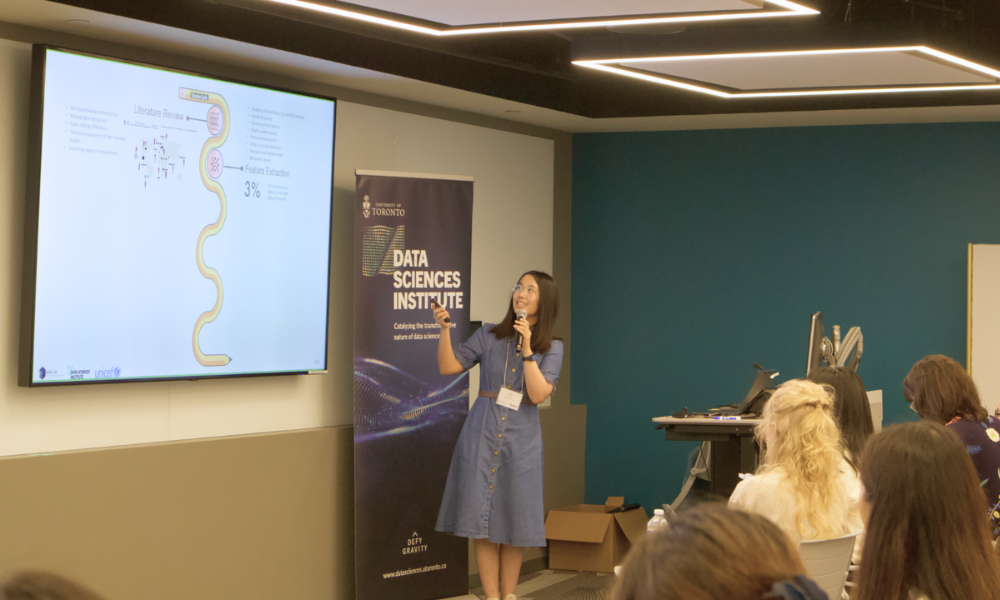Facing a data skills labour shortage, innovative certificates seek to accelerate participants' learning

This article was produced in partnership with the University of Toronto’s Data Sciences Institute.
Data scientists and machine learning engineers are increasingly being sought across industries, but the number one challenge Rohan Alexander hears about from colleagues is the difficulty they face hiring qualified talent.
“The most exciting AI you read about was developed in Canada, and largely at U of T,” says Alexander, Director of Technical Skills and Curriculum as well as an assistant professor at the University of Toronto, jointly appointed in the Faculty of Information and the Department of Statistical Sciences.
“Our hope is that by helping to establish a pool of folks trained in this technology, Canada can enjoy some of the benefits of the recent booms which we arguably helped bring about. The power of our offering is that we enable people across industries to elevate their technical skills to meet the evolving demand.”
U of T’s DSI responds to need for more technical talent
The Data Sciences Institute (DSI) serves as an incubator for data science research, training, and partnerships at the University of Toronto. Its mission is to provide the leadership and capacity to accelerate the impact of data sciences across disciplines to address pressing societal questions and drive positive social change.
To that end, and in response to Canada’s data skills labour shortage, the institute launched two certificates in November of 2023. With the financial support of Upskill Canada, powered by Palette Skills and the Government of Canada, DSI rolled out its Data Science Certificate and Machine Learning Software Foundations Certificate.
Each of these offers core technical skills alongside job readiness and career transition support, but for Alexander, these certificates stand out because they have “an extreme degree of industry involvement.” The curriculum was developed alongside an Industry Advisory Group, as well as by Alexander who connected with colleagues to get an understanding of what they wish their staff was able to do.
“Our collaboration with companies and community partners informed curriculum development naturally from day one,” he says. “Interestingly, the responses were fairly consistent across industries: technical skills are the foundation but matched with other skills such as a focus on reproducibility, ethics, and professional skills. We brought all of that together.”
The 16-week, part-time certificates provide opportunities for participants to absorb knowledge from non-profit and private-sector experts during employer case studies, which offer important insights into the professional world. Many of the technical facilitators and support staff are still working in the industry, bringing not only hypothetical examples but also practical ones of how to apply technology in the field.
Having actual examples of the work to talk about during interviews is useful, Alexander notes, adding that participants are also provided with a lot of support around the job search with opportunities for in-person and virtual career networking and a commitment to sourcing employment opportunities. A dedicated team combs through each participant’s CV and LinkedIn profile to get them as strong as possible, then helps match them with appropriate job postings.
“Our program is designed to enable learners to showcase the skills they’ve developed — we’re very focused on what the industry needs and helping learners show they’ve got it — and it works well. Several of them already have offers which is exciting.”
Future-proofing Canada’s talent with cutting-edge tech skills
Despite Toronto coming in third in the North American Tech Talent Hub rankings and boasting the most tech employment growth between 2016 and 2021, the Government of Canada Job Bank job openings for data analysts and manager categories are expected to face labour shortage conditions until 2031. Employed by an increasing number of high-growth sectors, these fields play a crucial role in driving innovation and productivity and the certificates were designed to offer affordable, flexible, and rigorous upskilling opportunities at a time when the industry needs talent the most.
And while the certificates address the data science talent shortfall by rapidly developing demand-driven skills so that participants can contribute to the Canadian economy immediately, it’s also very much focused on the future of the industry. There are plans to integrate AI into the certificates, exploring how participants can leverage tools like ChatGPT to increase productivity, for example.
“The Canadian tech industry is a global leader in innovation and productivity, and with so many new things coming onboard it’s an incredibly exciting time to be involved in data science,” Alexander says, adding that although industry demands are constantly evolving, future-proofing participants’ skills comes down to one fundamental: ensure professionals learn how to learn.
Implicitly teaching strategies for effectively using Google, for instance, if they have a problem they don’t know how to solve is a key part of how people in the industry actually work.
“There are always new problems that maybe they didn’t learn in the classroom, but they’ll learn how to go about the process of figuring it out,” Alexander says. “I continue my work with our talented and experienced staff as well as industry and internal academic partners to consistently establish and deliver updated curriculum — ensuring the skills learned in class are exactly what our employers need.”




